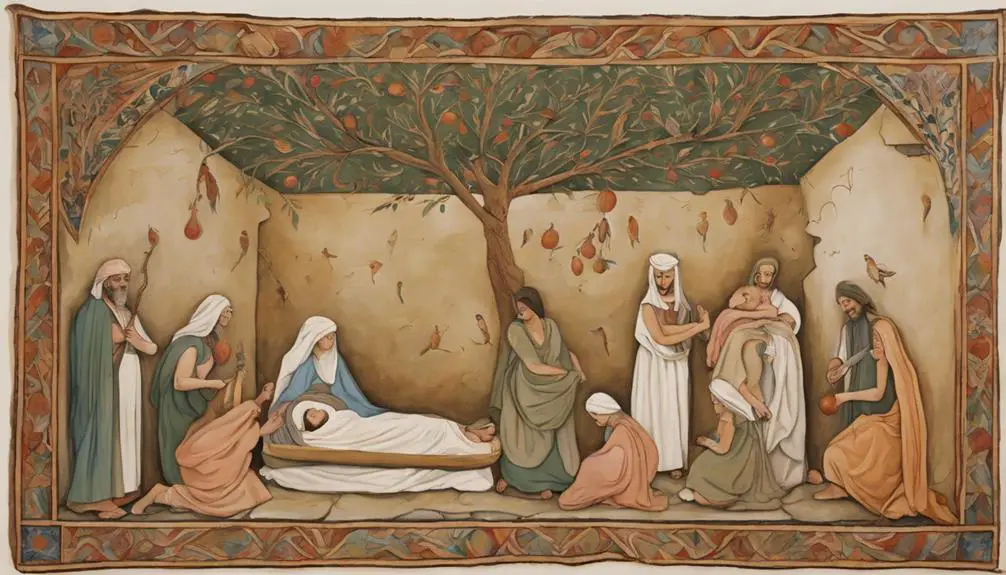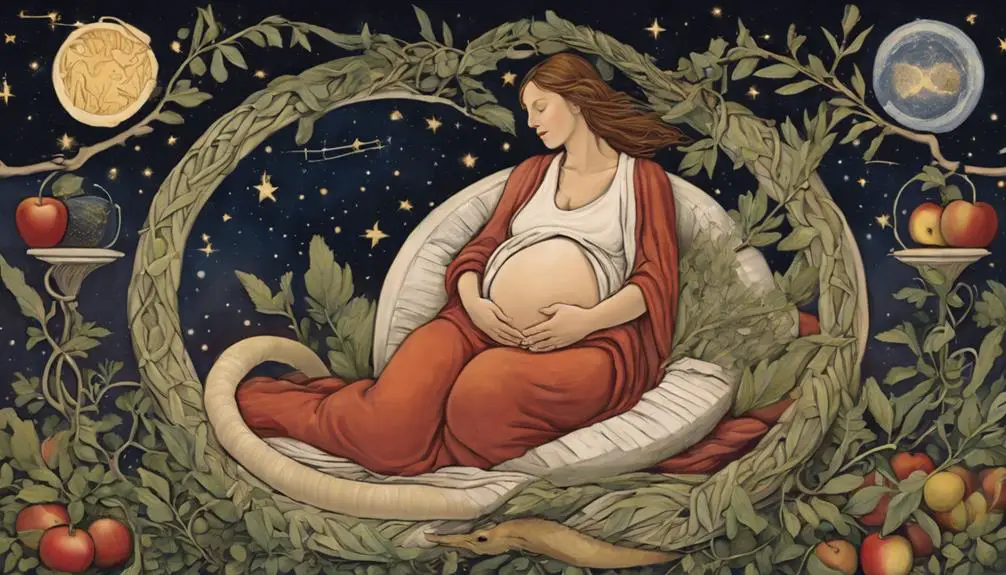Struggling with childbirth and spirituality? Dive into the Bible's symbolic depictions of birthing pains, revealing deep theological implications and spiritual rebirth.

Birthing Pains in the Bible
You've probably never thought of the Bible as a manual for childbirth, right? Yet, it's filled with profound depictions of birthing pains, each laced with deep symbolism and theological implications.
This perspective invites us to reconsider these passages not only as physical descriptions, but also as metaphors for spiritual rebirth, prophecies, and tests of faith. Curious about how these ancient texts can resonate with our modern understanding of childbirth and spiritual transformation? Let's explore it together.
Key Takeaways
- Birthing pains in the Bible symbolize significant transformation, distress, and hope for imminent events.
- These metaphors provide theological insights into suffering, redemption, and humanity's need for salvation.
- In prophecies, birthing pains signify periods of struggle and foretell divine interventions and new eras.
- Modern interpretations of biblical birthing pains metaphor resonate with societal adversities and signify potential for societal transformations.
Biblical Depictions of Childbirth

The Bible's portrayal of childbirth, often steeped in symbolism and metaphor, provides a rich tapestry for understanding the historical and cultural context of maternity in ancient times. The appearance of maternal figures and the practice of ancient midwifery are prevalent themes.
You'll notice that the Bible doesn't shy away from the gritty realities of childbirth, a testament to the significance of these maternal figures. Women like Rachel, who died in childbirth, and the midwives of Exodus, who defied Pharaoh's orders, are etched into biblical narrative, their stories intertwined with the essence of survival and defiance.
On another plane, the Bible introduces us to the art of ancient midwifery. Genesis recounts the story of a midwife assisting Rachel, providing a glimpse into the fundamental role these women played. They were the guardians of life, skilled practitioners who held the fates of both mother and child in their hands.
In examining these instances, you're able to unravel a more nuanced understanding of motherhood and childbirth in ancient times. It's a perspective that's raw, authentic, and deeply ingrained in the human experience. Through this lens, the Bible's depiction of childbirth becomes a powerful narrative, one that resonates even in our modern era.
Symbolism of Birthing Pains

Moving beyond the literal depictions of childbirth, you'll find that birthing pains serve as potent symbols woven into the fabric of biblical narratives. These instances aren't simply physiological descriptions, but they convey an intricate spiritual metaphor.
In the Bible, birthing pains often symbolize the advent of significant change, distress, or a new era. This symbolism is deeply rooted in the pain perception associated with childbirth, a universal and profound human experience. The intensity and inevitability of labor pains illustrate the inevitability and intensity of the events they symbolize.
For instance, in the book of Jeremiah, the prophet's agony and despair are depicted as birthing pains, signifying the imminent catastrophe befalling Israel. Here, the metaphor serves to emphasize not just the severity of the event, but also the hopeful promise of birth that follows the pain.
In the New Testament, Paul uses childbirth as a metaphor in Romans to express the creation's longing for the revelation of God's children. This articulates the deep spiritual yearning and the pain endured in anticipation of a promised, yet unseen, spiritual reality.
Role in Theological Context

In evaluating the role of birthing pains within a theological context, it's crucial to consider how they contribute to the overall biblical narrative and its interpretation. Birthing pains, symbolic of suffering and struggle, carry theological weight that can shape perspectives on faith, redemption, and sin.
Theological perspectives often view birthing pains as a consequence of humanity's original sin, aligning the physical struggle during childbirth with spiritual struggles. This connection deepens the understanding of human fallibility and the need for divine mercy.
On another note, the feminine divinity is often associated with birthing pains, reflecting the transformative power of life-giving. It's an embodiment of nurturing and creation, linking the feminine divine to the earthly and heavenly realms. Therefore, in the theological context, birthing pains aren't only seen as a punitive measure but also as a divine process, highlighting the duality in interpretation.
Furthermore, birthing pains have a role in shaping theological truths, particularly about suffering and redemption. They serve as a constant reminder of humanity's need for salvation, drawing attention to the redemptive power of faith.
Hence, birthing pains have a significant role in the theological context, shaping interpretations of biblical narratives, enriching theological perspectives, and enhancing understanding of feminine divinity.
Birthing Pains in Prophecies

Diving into the realm of biblical prophecies, you'll find that birthing pains serve as vivid metaphors for significant events, often foretelling periods of intense struggle before the emergence of a new era. These 'pain metaphors' are prevalent, resonating with the human experience of labor pain as a prelude to joyous birth.
Underpinning prophecy analysis, you'll discern that birthing pains metaphorically depict tribulation and suffering, typically preceding a divine intervention or a momentous event. This analogy provides an insightful perspective on the cyclic nature of history, where periods of hardship give birth to times of relief and renewal.
Here's a table to encapsulate the concept:
Biblical Prophecy |
Birthing Pains Metaphor |
|---|---|
Tribulation and suffering |
Pain before birth |
Divine intervention |
Relief after birth |
Momentous event |
Birth of a new era |
Modern Interpretations and Relevance

Analyzing these ancient metaphors of birthing pains in the context of modern interpretations, you'll find their relevance pervading today's societal challenges and transformations. Cultural perspectives have evolved, yet the essence of these metaphors remains pertinent. The birthing pains symbolize both struggle and the potential for new beginnings, resonating with the tumultuous climate of current societal transformations.
From a feminist interpretation, the birthing pains metaphor takes on a more profound significance. You'll see it as a powerful representation of women's strength and resilience. This metaphor reflects the often underappreciated endurance women exhibit during childbirth, paralleling the perseverance required to overcome societal adversities. It not only highlights the physical endurance but also the mental fortitude necessary to bring about change.
Frequently Asked Questions
How Did Cultural Norms During Biblical Times Influence the Perception of Birthing Pains?
In biblical times, cultural norms significantly shaped pain perception, particularly in childbirth. You'd find these norms influenced how birthing pains were viewed and accepted as a natural part of life.
Society's cultural interpretations often linked these pains to religious beliefs, attributing them to divine will. These cultural norms, deeply embedded in society, thus played a critical role in shaping attitudes towards birthing pains.
What Practical Remedies and Comfort Measures Were Available for Women Experiencing Birthing Pains According to Biblical Times?
You're exploring what practical remedies and comfort measures were available for women experiencing birthing pains during ancient times. Herbal remedies were commonly used, often administered by skilled midwives.
Midwifery practices included massage, position changes, and the use of soothing herbs. These techniques, though primitive by today's standards, provided some relief and were integral to women's care during childbirth.
These ancient practices laid the groundwork for modern obstetrics.
Were There Any Specific Prayers or Rituals Performed During Childbirth in Biblical Times?
Yes, there were specific prayers and rituals performed during childbirth in biblical times. They believed these practices lessened the pain significance and offered divine protection. Biblical interpretations suggest that such prayers were said by midwives and family members.
While detailed descriptions are scarce, it's evident that faith played a crucial role in childbirth during those times, providing a spiritual comfort to the laboring woman.
How Has the Understanding and Treatment of Birthing Pains Evolved From Biblical Times to Now?
You've asked about the evolution of understanding and treating birthing pains from ancient to modern times.
Initially, pain interpretation was tied to biblical symbolism, seen as a divine mandate. Now, it's understood medically, with options like anesthesia available to manage it.
This shift reflects a broader evolution in the intersection of religion and medicine, where faith remains significant, but scientific knowledge significantly guides treatment options.
Can the Concept of Birthing Pains in the Bible Be Related to Any Other Religious Texts or Beliefs?
Sure, you can definitely relate the concept of birthing pains to other religious texts or beliefs through comparative religion analysis. Birthing pains symbolism isn't exclusive to the Bible; it's found in numerous cultures and religions.
It's often seen as a metaphor for profound transformation or the birth of new spiritual understanding. Delving deeper, you'll find fascinating parallels and nuanced differences in interpretation.
Conclusion
You've journeyed through the Bible's depiction of childbirth, explored its symbolism, and analyzed its theological context.
You've seen how birthing pains feature in prophecies and grappled with their modern interpretations.
Remember, these narratives aren't just historical; they echo in our lives today.
So next time you encounter the metaphor of birthing pains in scripture or sermon, you'll understand its profound implications, contextual relevance, and enduring symbolic power.



Sign up